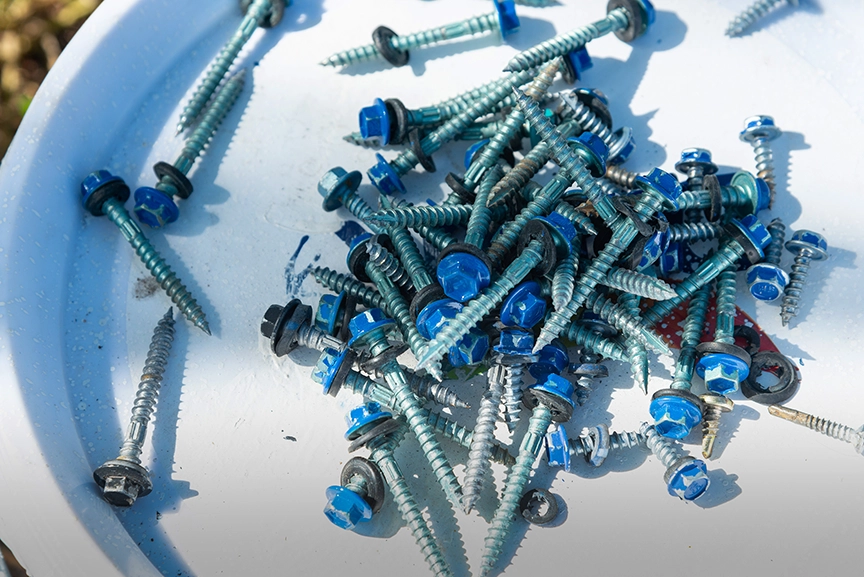Healthy Fasteners Will Ensure Your Metal Roof Lasts
When it comes to commercial building roof types, there are a lot of them. The most common types are single-ply, spray foam, metal, and shingle roofs. However, metal roofs stand head and shoulders above the rest when it comes to commercial roof types for industrial buildings and factories. That’s because metal roofs offer several benefits including durability, energy efficiency, weather resistance, sustainability, and low maintenance. According to State Farm Insurance, metal roofs can last 40 to 70 years, depending upon the material that is used!

However, to ensure your metal roof will last 40 to 70 years, you must use good fasteners. For standing seam metal roof applications, fasteners are required. A fastener can be defined as any type of screw, rivet, or device used to secure the metal panels, trim, and flashing materials together. A fastener can also be used to secure the roof deck itself.
There are many kinds of metal roof fasteners and fastener companies on the market for commercial roofs. Each fastener is designed for specific applications and conditions. To select the right roof fastener for your metal roof, you should consider the type of metal roof you have, the environmental conditions where the building is located, the structural requirements of the roof system, and the way you want the roof to look. Above all, selecting the appropriate fastener for your commercial roof will ensure you maximize your roof’s longevity and performance to prevent emergency roofing repairs.
Here are the most common types of metal roof fasteners:
Screws
Screws are the most commonly used fasteners for metal roofs. They come in different materials, such as stainless steel, galvanized steel, or aluminum, and are also available in various head styles including hexagonal or Phillips.
Nails
Although nails are less common than screws as fasteners for metal roofs, nails are still needed for some metal roofing installations. These fasteners are typically made of galvanized or stainless steel.
Clips
Clips are used to attach metal roofing panels to the underlying roofing structure without penetrating the panels themselves. Clips provide a clean, streamlined appearance and allow for thermal expansion and contraction of the metal, which is important in climates with extreme hot and cold temperatures.
Rivets
Rivets are often used to join metal roofing panels together or to attach accessories like flashing or trim. They are durable and provide a strong connection.
Locking Mechanisms
Some metal roofing systems utilize interlocking panels that snap or lock together rather than relying on traditional fasteners. These systems provide a sleek look and can be easier to install.
Stitch Screws
Stitch screws are typically used to attach metal roof panels to purlins or other structural components. These fasteners have a unique design that allows them to create a watertight seal while securely fastening panels in place.
Seam Fasteners
In standing seam metal roofing systems, seam fasteners are used to secure the seams of adjacent panels together. These fasteners are often concealed for a clean appearance and enhanced weather resistance.
Once you have selected the right fasteners for your metal roof, you need to make sure they are properly maintained. That’s because improper maintenance of metal roof fasteners can lead to several problems, potentially compromising the integrity and performance of your entire roofing system.
To prevent problems from occurring, make sure that a regular review of fasteners is part of your commercial roof maintenance plan. A skilled roofing technician can identify signs of damage that require immediate or future repairs. Some common fastener issues that should be addressed as part of a commercial roof maintenance program include:
- Loose fasteners that can cause metal fatigue
- Water infiltration as the result of loose or missing fasteners
- Corrosion
- Deterioration of sealants or gaskets
Furthermore, many roofing manufacturer warranties require regular maintenance and inspection of the roof system, which includes the fasteners, for the warranties to remain valid. Failure to maintain the fasteners properly could void the weathertight warranty, leaving the building owner responsible for any repairs or replacements.
To avoid these potential pitfalls, it’s essential to implement a regular commercial roofing maintenance plan for metal roof fasteners. If your company doesn’t have a roof maintenance plan in place, contact Capital Roof Care. Our trained roofing professionals can help you set up a roof care maintenance plan to extend the lifespan of your roof and prevent a possible roofing emergency in the future.
Sources:
Sheffieldmetals.com
Statefarm.com
Realestate.usnews.com